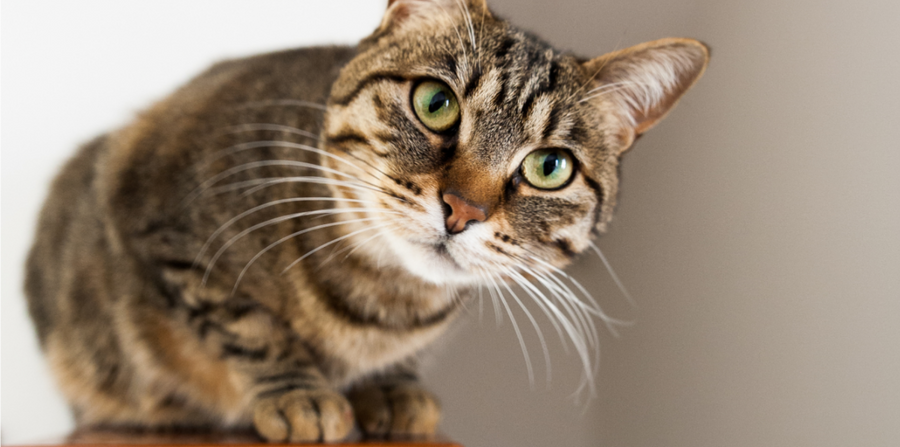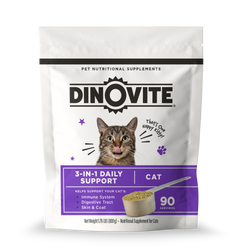Allergies in Cats

Allergies in Cats: Causes, Symptoms, and How to Help
Allergies in cats are a common but often misunderstood issue. Whether your cat is sneezing frequently, experiencing skin irritation, or suffering from digestive upset, allergies can significantly impact their comfort and overall health.
Understanding the causes, symptoms, and management strategies for cat allergies is essential for keeping your feline friend happy and healthy.
Why Is My Cat Sneezing?
If your cat keeps sneezing, you may wonder if it's due to allergies in cats, illness, or something else. Occasional sneezing is normal, but persistent sneezing can indicate an underlying issue. Some common reasons why your cat may be sneezing include:
- Allergies in cats from the environment like dust, pollen, or mold
- Irritants such as scented candles, perfumes, or cigarette smoke
- Respiratory infections, including viral and bacterial infections
- Dental issues, which can lead to sinus infections
- Foreign objects, like dust or small particles lodged in their nose
If your cat is sneezing a lot, monitoring their symptoms and identifying potential triggers is the first step toward finding relief.
.png)
Symptoms of Allergies in Cats
The symptoms of allergies in cats can vary depending on the type of allergy they have. Common signs include:
- Sneezing and coughing (especially if your cat sneezes a lot and has nasal discharge)
- Itching and scratching, particularly around the head, neck, and ears
- Red, inflamed skin that may be accompanied by hair loss
- Digestive issues, such as vomiting or diarrhea
- Ear infections, frequent head shaking, or excessive ear scratching
- Excessive licking or chewing, especially on the paws and legs
Recognizing these symptoms early can help you determine if your cat’s sneezing or discomfort is due to allergies or another health concern.
Causes of Cat Sneezing and Allergies
Allergies in cats can stem from a variety of sources. The four main types of cat allergies are:
1. Food Allergies
Food allergies occur when a cat's immune system overreacts to certain ingredients in their diet. Common allergens include:
- Proteins like beef, chicken, or fish
- Dairy products (most cats are lactose intolerant)
- Grains such as wheat, corn, and soy
If your cat has food allergies, they may experience chronic digestive issues, itchy skin, or recurrent ear infections. Switching to a hypoallergenic or limited-ingredient diet can help alleviate symptoms.
2. Environmental Allergies
Cats can be allergic to airborne substances, including:
- Pollen from trees, grasses, and weeds
- Mold and mildew, which thrive in damp environments
- Dust and dust mites, commonly found in carpets and furniture
If your cat has environmental allergies, they may sneeze frequently, have watery eyes, or experience respiratory issues.
3. Flea Allergies
Flea allergy dermatitis is a common skin condition caused by an allergic reaction to flea saliva. Even a single flea bite can cause intense itching, skin redness, and hair loss. Consistent flea prevention is essential for managing this type of allergy.
4. Contact Allergies
Some cats develop allergic reactions to materials or substances they come into contact with, such as:
- Certain fabrics, like wool or synthetic materials
- Plastics and rubber, often found in food bowls or toys
- Household cleaning products, such as detergents and floor cleaners
If your cat has contact allergies, switching to hypoallergenic materials and using pet-safe cleaning products can help.
When Should You Worry About a Cat Sneezing?
While an occasional sneeze is normal, you should be concerned if your cat:
- Sneezes frequently and has persistent nasal discharge
- Has difficulty breathing or wheezing
- Develops swollen eyes or excessive tearing
- Shows signs of lethargy or loss of appetite
These symptoms could indicate a more serious issue, such as a respiratory infection or an underlying health condition requiring veterinary attention.
Should I Be Alarmed If My Cat Is Sneezing?
Mild sneezing due to dust or minor irritants isn’t usually a cause for concern. However, if your cat's sneezing is persistent and accompanied by other symptoms, it's important to monitor them closely. Allergies, infections, or even dental problems can lead to excessive sneezing.
What Can I Do for My Cat with Allergies?
Managing your cat’s allergies involves identifying triggers and implementing appropriate treatments. Here are some steps you can take:
- Dietary Management. For food allergies, switching to a hypoallergenic or limited-ingredient diet can help. If you suspect a food allergy, try eliminating common allergens like chicken or grains and monitor your cat’s reaction.
-
Environmental Control. Reducing exposure to allergens can help alleviate symptoms. Strategies include:
- Frequent cleaning to reduce dust and mold buildup
- Using air purifiers to minimize airborne allergens
- Avoiding scented products, such as detergents, candles, and air fresheners
- Flea Prevention. Year-round flea control is essential, even for indoor cats. Regularly administer flea preventatives and clean your cat’s bedding and living areas frequently.
- Supplements for Allergies in Cats. Adding probiotics for cats or omega-3 fatty acids to your cat’s diet can support immune function and skin health. Products like Dinovite for Cats can help improve coat condition and reduce allergy-related symptoms.
- Medications and Treatments. In severe cases, your veterinarian may prescribe antihistamines, steroids, or allergy shots to help manage symptoms. Allergy testing may also be recommended to identify specific allergens.
- Veterinary Diagnostics. Diagnosing allergies often involves a process of elimination, such as dietary trials or allergy testing. Working closely with your vet can help pinpoint the cause and create a tailored treatment plan.

Final Thoughts on Allergies in Cats
Cat allergies can be frustrating, but with the right management strategies, your feline friend can live a comfortable, happy life. By identifying the cause, recognizing symptoms early, and working with your veterinarian, you can develop an effective plan to keep your cat healthy.
If you notice persistent sneezing, itching, or digestive issues, consider adjusting your cat’s diet, reducing allergens in their environment, and consulting with your vet for the best course of action.
*All information is for educational purposes only and is not intended to replace the expert advice of a veterinarian.
Related Products



